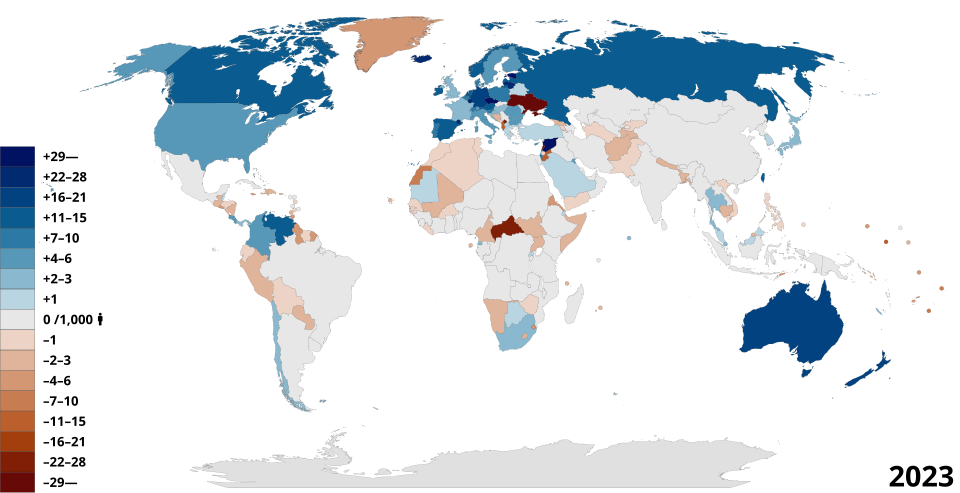Chris Powell: Illegal-immigration backers ignore its enormous costs
Net migration rates per 1,000 people in 2023, showing flows to more affluent nations, in blue, from poorer nations.
MANCHESTER, Conn.
Last week two groups supporting illegal immigration, Connecticut Voices for Children and the Immigration Research Initiative, issued a report warning that mass deportation of the state's illegal-immigrant population -- estimated at as many as 150,000 people -- would be disastrous for the state's economy and state government. The report claimed that illegal immigrants pay more than $400 million in state taxes each year.
This was at best a dodgy estimate. Many illegal immigrants are children and are not employed. The adults among them cannot work legally and so most of their earnings cannot be tracked. While anyone who spends money in Connecticut is likely to pay sales taxes, the report acknowledges that nearly all illegal immigrants who work in Connecticut hold low-wage jobs.
So what they buy is mainly for subsistence, like food, which is exempt from sales tax.
But the bigger flaw in the report is that it omits anything about the costs of illegal immigration in Connecticut, which are huge and increasing, particularly on account of the state government medical insurance being extended to them and the education of their children, most of whom don't speak English and enter the state's schools without providing any record of their education elsewhere and so need to be laboriously evaluated for placement. These students have exploded expenses in the schools of Connecticut's “sanctuary cities," which in turn seek much more financial support from state government.
In February the Yankee Institute, drawing on estimates from the Federation for American Immigration Reform, contended that illegal immigration costs Connecticut more than $1 billion a year.
Whatever the true cost, that it likely weighs heavily against illegal immigration became clear when Governor Lamont, a supporter of the state's “sanctuary’’ policies, disputed the Yankee Institute estimate even as he conceded to a journalist that he had no idea what illegal immigrants cost state government. The governor referred the journalist to the state budget office, which said it had no idea of the cost either and wasn't going to find out.
That is, advocates and apologists for illegal immigration in Connecticut don't want to know its costs, and, worse, don't want the public to know either.
The report from Connecticut Voices for Children and the Immigration Research Initiative is defective in other ways. It asserts that if Connecticut lacked illegal immigrants it would experience a severe shortage of workers for the low-wage jobs they hold -- especially in construction, restaurants, agriculture, janitorial work, and beauty shops.
This is the cliche that illegal immigrants do jobs citizens won't do, and it is nonsense.
Citizens will do almost any job if wages are high enough and can compete with the welfare benefits available to them. Indeed, the jobs held by illegal immigrants are so poorly paid in large part precisely because illegal immigrants are available to do them without the wage,
benefit and labor protections required for citizens. Raise agricultural salaries enough and even some teachers, charity organization workers, and journalists in Connecticut may be tempted to return to picking shade tobacco as many did as teenagers.
Connecticut is full of low-skilled citizen labor. With its social-promotion policy, public education makes sure of that.
For years the state's manufacturers have lamented that they can't find skilled workers for tens of thousands of openings. Meanwhile, middle-aged single mothers are not working at fast-food drive-through windows because they are so highly skilled. But jobs requiring lesser skills are where young people are supposed to start, not remain as adults.
So Connecticut doesn't need to import more low-skilled workers, especially since the state has failed so badly with its housing supply. The state needs to find ways of raising skills and wages and reducing the cost of living, especially the cost of housing, for its legal residents.
But the report from the apologists for illegal immigration sees the path to prosperity as a matter of legalizing all illegal immigrants, in effect reopening the borders. It didn't work the first time.
Chris Powell has written about Connecticut government and politics for many years (CPowell@cox.net).
